PROFILE
Building a different world
Jackie Macadam meets Carolyn Merry, the newly appointed director of Place for Hope, a charity with roots in the Church of Scotland.
“IT is an incredible privilege to be a peacemaker in such a time and to be able to support more people to become peacemakers, challenge injustice and systemic violence and transform the future.”
Peace has always been important to Carolyn Merry, newly appointed director for Place For Hope, an initiative of the Church of Scotland, that, in 2015, became an independent charity.
“I was born in London, but grew up in Australia after my family emigrated there when I was four,” she says. “As an 18-year old, I had a profound and very personal encounter with God that completely changed my life from the inside out. It was the start of a journey with God that has radically underpinned the way I have lived my life, my values, relationships and the personal and the professional choices I have made ever since.
“That moment changed everything for me and resulted in choices that increasingly led me out of my comfort zone and to grow personally and professionally in my understanding of following Jesus and being a Christian in a complex world.” Ironically, Carolyn’s desire for peace has drawn her towards some of the most difficult and dangerous places on earth.
“Peace has been a concept that took seed for me at a very young age and has evolved in small steps over the course of my life. As a child for some reason, I felt a strong connection with the actual word before I ever knew what it meant –I just liked the look of it and would often weave it into my doodling!
“The evolution in my understanding of peace has been closely intertwined with my faith journey as I have been challenged by my experiences around the world and as my personal relationship with God has grown.
“My professional path over 30 years has been varied. After initially becoming a secondary school teacher, I later retrained as a nurse after returning from working as a volunteer in India with the Missionaries of Charity. Nursing gave me the opportunity to work with indigenous communities in rural Australia before becoming a specialised nurse in Emergency Medicine. I worked for over a decade with the medical, humanitarian agency Médecins Sans Frontières (MSF), in roles from Field Nurse to Head of Mission, in Afghanistan, East Timor, Sierra Leone, Liberia, Northern Caucasus, Malaysia, Zimbabwe and Yemen. Those years working in predominantly conflict and post-conflict situations gave me the privilege to live and work with incredible people in extraordinary times and circumstances.
“There have always been common threads to my life: my faith, care for people, especially those most impacted by injustice, violence and exclusion, and a desire for all to live in peace – with God, with themselves and with others.”
Carolyn’s work with MSF took her to some of the world’s worst conflict areas.
“I have had the privilege and heartbreak of spending a significant portion of my adult life living and working in multiple conflict zones and/or places of extreme violence and poverty, and have seen a great deal of mass violence and death up close.
Those experiences and the lessons I learned from them changed my life and continue to do so. Some of those lessons I reflect on most days when I see or read of violence both near and far. They remind me afresh of the impact of the daily choices I make and how they can either contribute to greater peace or greater violence in the world.
“All violence sickens me – whether mass physical violence reported from around the world, individual physical, emotional and sexual violence that mostly happens behind closed doors, or widespread cultural and structural violence that insidiously dehumanises and demeans the inherent value and dignity of any individual or groups of individuals. For me, violence is simply anything that demeans or harms another being, or ourselves. Anything, that tries to make them less than the whole that God created them to be. And so being non-violent means sometimes looking beyond how someone is at any given moment and treating them with the respect and love required for their precious, God-created selves, however hidden that self may be. Being non-violent means working for the well-being of the ‘other’ as much as for myself.
“The perspective I gained through having lived and worked in so many different contexts and being witness to all manner of people being discriminated against, violated, and killed, was seeing again and again that any difference, whether it be faith, colour of skin, ethnicity, gender, political affiliation, class, profession, sexual orientation, disability, age or historical animosity to name just a few, could be used as excuse to justify hatred and violence and indeed they are daily. The core of all violence is the insidious and abhorrent idea that some people have less value than others and when this was coupled with power of any sort and fuelled by a world view based on fear instead of love, then the most horrendous acts could be perpetrated by quite ordinary people.”
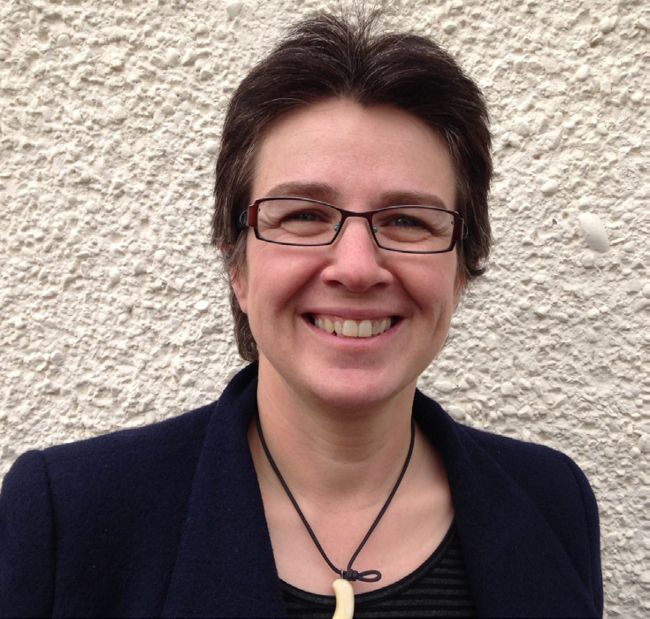
Carolyn Merry
“There have always been common threads to my life: my faith, care for people, especially those most impacted by injustice, violence and exclusion, and a desire for all to live in peace – with God, with themselves and with others.
She adds: “In many ways, the responses required to mass violence in the places I worked, were quite direct and practical in terms of providing medical care, mental health support, basic physical needs, safety … although they always felt inadequate at the time. But when all the survivors had received treatment, as much information and assistance as possible had been given to relatives and communities, and those killed had been given whatever dignity could be afforded – that was when for me, my most personal response could be given. The only response I have ever been able to give in the face of great tragedy and pain – was silence. I know many others find they need to talk things through at such times, but for me it is in being silent when I am most able to pay respect to the profound loss and pain that has occurred; it is in being silent when I am able to fall to my knees before God and express my grief and anger at the pain that we human beings can bring upon one another; it is in being silent where I receive the strength from God to dust myself off and stand again in God’s Spirit with a recommitment to love despite the violence and fear; it is in being silent that I can question myself as to whether I am living my life as non-violently as I am called to by my faith – with enough compassion, grace, and hope, as well as by the way I help facilitate reconciliation and challenge the status quo that allows violence to persist and flourish.
“Most importantly for me, it has been in those moments of silence spent beside and listening to those most affected by mass violence, that I have often felt the deepest connections of life – as I have sat and wept together with village elders or government officials after a massacre, or mothers holding their dead children, or survivors of the sexual violence widely used as a weapon of war. Words were always inadequate in the face of such obscene violence and the enormity of the pain and fear felt at those times. Solidarity and common humanity were somehow expressed best and God’s presence felt most powerfully in those moments of silence.”
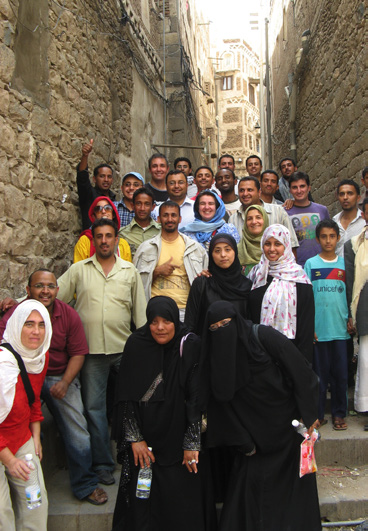
Carolyn with part of MSF team in Afghanistan
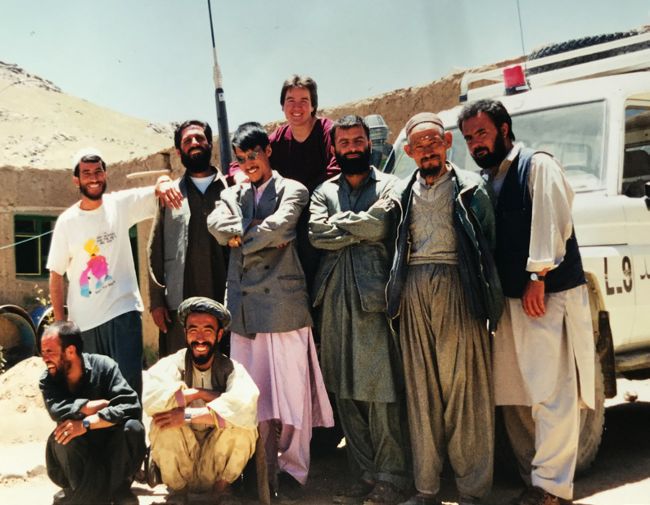
MSF team Yemen 2010
“Prior to Place for Hope, I was CEO for The Feast –a Christian youth charity, that brings together young people across the UK of all faiths and none to encounter difference, live well with it and build friendships across social divides.
After her time with MSF and in emergency departments in Australia, Carolyn began to feel drawn towards pursing her interest in helping people in other ways.
“When I chose to leave working in contexts of mass violence I did so because for me focussing only on violence seemed inadequate for achieving real change. To continue to follow God’s calling to be a peacemaker, I chose to no longer spend most of energies responding against the hydra of violence in all its forms, but rather towards building a different world, one in which fear is replaced by love, violence by compassion and dialogue, exclusion by inclusion, and hatred and intolerance (and even tolerance) replaced by embracing and celebrating diversity and the richness that differences bring to life. It may seem a subtle difference but it has been a lifegiving one for me.
“Prior to Place for Hope, I was CEO for The Feast –a Christian youth charity, that brings together young people across the UK of all faiths and none to encounter difference, live well with it and build friendships across social divides. The Feast doesn’t tackle extremism, prevent knife crime, improve mental health, or address social action issues – although happily these are often the side benefits of what it does. Rather, The Feast asked young people to dare to imagine a transformed world in which all people are confident in their beliefs and identity, embrace diversity, and be able to flourish alongside one another in peaceful, loving and inclusive communities – and then provides them with the safe spaces and opportunities and skills to be build such lives and communities. It was a very positive approach and based on equipping young people with the skills to dialogue honestly and respectfully across difference.
“When the role of Director at Place for Hope was advertised last year, it was a particularly compelling one for me, because of the nature of the charity itself set within the increasingly divided world that was being highlighted by Covid-19. I loved the work of The Feast, but the purpose of Place for Hope to accompany and equip people and faith communities to realise their potential as peacemakers who navigate conflict well is so closely aligned to what my own life has been about and I believe is more needed than ever in the world.
“In these times of accelerated change and conflict, including for the Church,” she says, “the idea of faith communities being equipped as places for hope that can: notice brokenness and division, nurture relationships and community, navigate change and conflict with graciousness and nourish wholeness in themselves and their communities, is both inspiring and in my view, absolutely vital.
“I have spent a lifetime trying to better understand and respond to violence. It is the path which led me to peacemaking. though, peacemaking requires more of me through a completely different approach. An approach that helps build a different foundation for society, built on love and equality and inclusion. Faith communities have a call to be peacemakers and so I am incredibly grateful that I get to work for Place for Hope with a great team and faith communities and daily focus on building a peace-filled world together. To support people and faith communities to be peacemakers and places for hope in such divided and fearful times is for me, an opportunity of a lifetime.”
Carolyn balances her work with time spent away from the office, out in the natural world.
“As a cyclist and nature lover, I have found both pursuits a natural entry to spending time daily with God and a space for being challenged and nourished. Although my family is spread all over the world, having now settled in the UK has also enabled me to have a dog once more and the long daily walks in nature has been an utter blessing, especially over this time of pandemic. My Golden Retriever, ‘Pace’ (Italian for peace – and named in honour of St Francis of Assisi’s blessing “Pace e Bene” – Peace and all good) – is a lifeline. He gets me up, earlier than I would like, every morning!
“More importantly what keeps me up is a sense of vision of how transforming God’s love is in the world and playing my part in growing that – living a simple life, that will contribute towards a peaceful world in which all can love and be loved, belong and flourish. And always alongside that, are the memories of those I lived and worked with. Honouring the courage and suffering of untold numbers of people we never usually get to hear about, is something that will always drive me to work for a more just and peaceful world for all.”
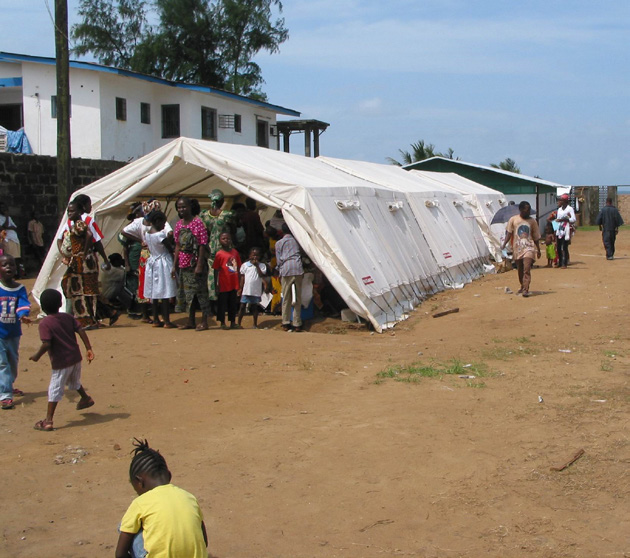
Liberia 2004
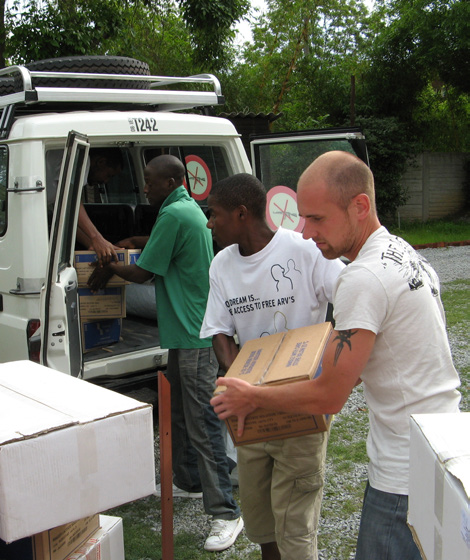
Team loading vehicle during cholera epidemic Zimbabwe 2008